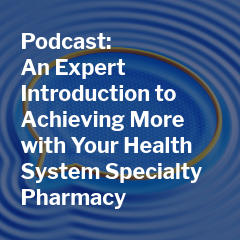
The first in a series of interviews with our Specialty Pharmacy Enablement expert, Ginger Thorpe, covering important questions health systems should be asking.
Increasing chronic disease management efforts to improve patient outcomes.
By
Date
September 12, 2022

By: Ram Arumugam
Read time: 4 minutes
Chronic Disease Day, held annually on July 10th, is an opportunity to reflect on progress and highlight opportunities for advancing patient access to care, as well as a chance to educate policymakers about the chronic disease community.
Chronic disease accounts for 7 of the top 10 causes of death in America and more than 90 percent of annual healthcare spending. Hundreds of thousands of Americans who suffer from chronic conditions need access to care. But the deadliest and costliest chronic diseases are also some of the most preventable.1
When it comes to addressing the growing demands of chronic disease care, technology will play a key role. Advancements in precise detection and diagnoses will help minimize the cost of treating chronic conditions. In addition, genome sequencing and molecular diagnostics have also given health sciences a better understanding of the nature of diseases and provided pathways to developing personalized treatments.
Advances in medical screening technologies have provided opportunities for screenings to take place safely and accurately in the pharmacy setting, where permitted by state law. This may include blood tests to check blood sugar levels for diabetes or blood pressure machines to check for hypertension.
Pharmacists and pharmacy team members play an important role in managing chronic diseases. As part of a primary care team, pharmacists are well-positioned to meet with patients, review labs, and prescribe and adjust medications. For providers, embedded specialty pharmacy staff may also ease the burden of prior authorization and other administrative requirements.
Applications embedded in pharmacy management systems can track adherence and flag non-adherent patients for interventions and create customized clinical programs to meet the specific needs of patients. Other pharmacy management system apps such as medication therapy management portals and automated medication synchronization scheduling tools, can also help retail and outpatient pharmacies drive improved adherence and better management of chronic medical diseases. They can also help patients access financial resources and navigate insurance issues.
At the time of diagnosis, many patients are concerned with coverage and affordability. But with over 5000 unique Patient Assistance Programs in the market today, teams like McKesson RxO can help health system customers identify, navigate, and ensure that patients are enrolled. The goal is to protect patient access to necessary care and help secure financial assistance through manufacturer programs and 501c3 programs.
For example, one study found the average direct medical cost for Multiple Sclerosis (MS) ranged from $3,000-$8,000 annually. MS is just one of the many chronic disease states where McKesson RxO helps health system patients.2
Making use of Patient Assistance Programs helps structure patient care. It alleviates some of the patient’s financial concerns and provides hope that the access to the care will be there. No patient should set their focus on affordability when it comes to the treatment they need. Their focus should be set on reaching milestones and reaching a cure.
Good Days, a national nonprofit organization that lifts the burdens of chronic illness through assistance, advocacy and awareness, each year spearheads Chronic Disease Day to help lower the number of preventable illnesses and increase access to care for people with chronic and rare conditions. Thanks to the support of grassroots advocates across the country, 40 U.S. governors joined Good Days this year to recognize Chronic Disease Day on July 10, while landmarks across the country including in New York, Boston, Minneapolis, Little Rock, Dallas, and Honolulu lit up orange to show support. In collaboration with more than two dozen leading national patient advocacy groups, Good Days organized a series of Chronic Disease Day events to bring together stakeholders who can help to advance positive change. Among the many distinguished speakers from those events whose remarks can be watched and listened to at www.chronicdiseaseday.org are the Director of the Centers for Disease Control and Prevention, Dr. Rochelle P. Walensky, and the Acting Director of the National Cancer Institute, Dr. Doug Lowy.
While people live longer with costly chronic conditions, there needs to be increased chronic disease management efforts. As programs and technology evolve, disease management could become more effective and efficient at helping people with chronic conditions.
Learn how McKesson helps health systems achieve more.
1https://chronicdiseaseday.org/legislative-agenda/
2Callaghan B, et al "Out-of-pocket costs are on the rise for commonly prescribed neurologic medications" Neurology 2019; DOI: 10.1212/WNL.0000000000007564.